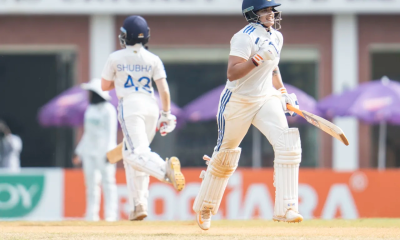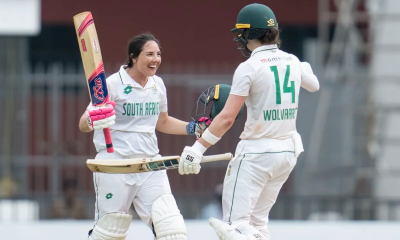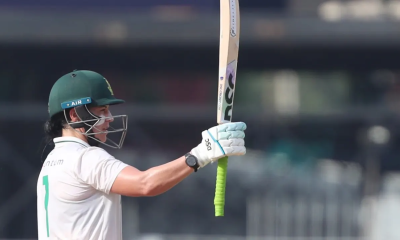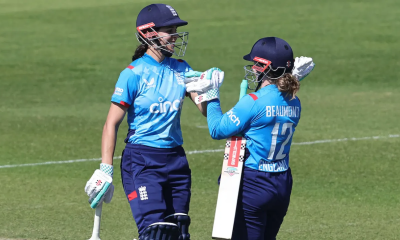Editorial
Where corruption is bliss …

Friday 24th November, 2023
Sri Lanka’s cricket crisis has become internationalised. Sports Minister Roshan Ranasinghe and the Opposition insist that some Sri Lanka Cricket (SLC) officials were behind the International Cricket Council’s decision to suspend SLC. They have produced documentary evidence to prove their claim and tabled in Parliament the copies of the letters that SLC officials wrote to ICC, allegedly seeking a ban.
The cricket dispute in Sri Lanka took a dramatic turn with the BCCI (Board of Control for Cricket in India) being accused of having SLC on a string. President Ranil Wickremesinghe is reported to have denied former Sri Lankan Cricket Captain Arjuna Ranatunga’s claim that BCCI Secretary Jay Shah runs and ruins SLC. He has reportedly told Indian news website, Firstpost, that he apologised to Jay Shah personally. Why should Sri Lanka’s Head of State go out of his way to apologise to an Indian cricket board official for something that a former Sri Lankan cricketer has said?
The general consensus in this country is that Indian cricket officials and some other Indians including those of dubious background wield influence over Sri Lanka’s cricket administration. Cricket has become a billion-dollar industry, and the interests of moneybags take precedence over those of the game. However, President Wickremesinghe’s right to dispute what Arjuna says about cricket or anything else for that matter cannot be questioned. But since Arjuna is not a member of the government, what he says about Jay Shah or anyone else in India is his personal opinion. Therefore, there is no reason why the President of Sri Lanka or any other government leader should apologise to Shah for Arjuna’s statements however controversial they may be.
The Indian Prime Minister and the Indian President do not apologise even for scathing attacks that some Indian politicians carry out on Sri Lanka, do they? Thousands of South Indian trawlers enter Sri Lanka’s territorial waters every month and engage in illegal fishing at the expense of local fishers and cause enormous losses to the ailing economy of this country, but has any Indian leader apologised for this serious offence?
It is obvious that the SLPP-UNP government considers Sports Minister Ranasinghe a thorn in its flesh because he has launched a campaign against the corrupt who have ruined Sri Lanka’s cricket. On seeing some ruling party politicians’ partiality to notorious crooks, one may say that where corruption is bliss, ‘tis folly to be honest.
Lesson for legislature
Minister of Education Susil Premajayantha informed Parliament yesterday that the principal of a school in the Nawalapitiya area had been transferred pending an investigation into a complaint that he had forced two of his students to eat polythene lunch sheets, etc., as punishment.
The Ministry of Education (MoE) is investigating the aforesaid unfortunate incident in a proper manner. If the suspect had been allowed to remain in the same school, he would have been able to cover his tracks.
If only Parliament adopted the same procedure in investigating vital issues that affect the people’s lives. It has entrusted the task of conducting an investigation into Sri Lanka’s bankruptcy to a Parliamentary Select Committee (PSC) headed by the General Secretary of the SLPP, whose leaders are among those responsible for ruining the country’s economy and placing the public in a situation where most of them have no way of dulling the pangs of hunger.
Will Parliament learn from the MoE how to conduct probes properly?
Editorial
A tale of two AGs and dirty politics

Friday 23rd January, 2026
The JVP-led NPP government has delayed the appointment of one AG—Auditor General—and is in overdrive to oust the other AG—Attorney General. Determined to parachute a ruling party crony into the post of Auditor General, allegedly in a bid to cover up corrupt deals on its watch, the government is believed to be biding its time until the reconstitution of the Constitutional Council to achieve its goal. The JVP/NPP is unashamedly using its propaganda brigade to carry out malicious social media attacks on Attorney General Parinda Ranasinghe Jr., PC, and having public protests held against him in a bid to hound him out of office.
It is said that a bad workman blames his tools. Similarly, an incompetent government quarrels with vital state institutions and public officials when it finds itself in trouble or fails to deliver. Inefficient, arrogant politicians also launch witch-hunts against key state officials who have the courage to stand up to political pressure, fiercely defend their independence and carry out their duties and functions without fear or favour. This, we have witnessed during successive governments. It is no surprise that the JVP-led forces are all out to oust AG Ranasinghe.
Not that the Attorney General’s Department has been truly independent and blameless; it has its fair share of servile officials who pander to the whims and fancies of ruling party politicians. This newspaper has been critical of the manner in which the AG’s Department handled some cases and helped open escape routes for politicians in power and their cronies. There is a huge backlog of cases due to inordinate delays on the part of the AG’s Department. These institutional deficiencies have been there for decades, and the incumbent AG alone cannot be blamed for them. There is a pressing need to straighten up the AG’s Department, which is in need of restructuring. Devolution is among the proposed solutions.
Government supporters have been holding protests, making unsubstantiated allegations against AG Ranasinghe and calling for his ouster. The tendency to hold kangaroo trials is in the JVP’s DNA. The JVP acted as the prosecutor, judge, jury and executioner in the late 1980s; it gunned down quite a few professionals including University Vice Chancellors and the heads of some other state institutions during its reign of terror. Now, it has apparently shifted from assassinations to character assassination, which can be a fate worse than death for most people. It used death-dealing sparrow units to eliminate its targets in the past. Today, it deploys its propaganda brigade to destroy its opponents politically.
If anyone believes that the AG is at fault, he or she can invoke the jurisdiction of either the Appeal Court or the Supreme Court to seek redress. If the government has irrefutable evidence to prove its supporters’ allegations against AG Ranasinghe, then Parliament can remove him after a probe. Dirty social media attacks and protests are certainly not the way.
In 2012-13, the JVP rightly defended the then Chief Justice Dr. Shirani Bandaranayake, when the Mahinda Rajapaksa government targeted her for political reasons and launched a vilification campaign against her before wrongfully impeaching her. Now, the JVP-led NPP government stands accused of trying to get rid of the state prosecutor.
The ongoing propaganda campaign against the AG could also be part of a strategy to paint a black picture of the AG’s Department, turn public opinion against it and prepare the ground for setting up the proposed Independent Prosecutor’s Office.
When the present-day government leaders promised ‘a system change’ during their election campaigns in 2024, it was thought that they were planning to change the systems for the better, but now one wonders whether they are bent on changing the existing systems for the worse by politicising them more.
The Bar Association of Sri Lanka deserves praise for having taken up the cudgels for beleaguered AG Ranasinghe. Let all right-thinking Sri Lankans, particularly the state sector professionals, be urged to follow suit.
Editorial
Conspiracy to subvert constitutional order

Thursday 22nd January, 2026
Former South Korean Prime Minister Han Duck-soo was yesterday sentenced to 23 years in prison for aiding and abetting the insurrection of the impeached former President Yoon Suk-yeol in 2024. The court confirmed that Yoon’s declaration of emergency martial law on 03 Dec., 2024 constituted an insurrection aimed at subverting the constitutional order. It pointed out that Han had helped provide a procedural facade of legitimacy for the illegal martial law by holding an unlawful Cabinet meeting.
That is how South Korea has dealt with those responsible for ‘an insurrection aimed at subverting the constitutional order”. But in Sri Lanka, no investigation has been launched into an illegal bid to appoint an interim President in violation of the Constitution and plunge the country into anarchy in 2022.
Irrefutable evidence has emerged that at the height of Aragalaya, on 13 July 2022, a foreign diplomat and a group of Sri Lankans consisting of religious leaders made a blatantly illegal bid to pressure the then Speaker Mahinda Yapa Abeywardena to take over the executive presidency in violation of the Constitution. Abeywardena himself said so in Parliament in early 2024. Following the defeat of a motion of no confidence against him, Abeywardena disclosed that after President Gotabaya Rajapaksa’s resignation in July 2022, he had come under immense external and internal pressure to take over as president. When he refused to comply, they had resorted to intimidatory tactics, he said, claiming that their intention was to create in Sri Lanka a situation similar to that in Libya. In other words, they sought to commit a serious crime against the State of Sri Lanka.
Professor Sunanda Maddumabandara, who was Senior Advisor (Media) to President Ranil Wickremesinghe, has disclosed in his book, ‘Aragalaye Balaya’ (‘Power of Aragalaya’), that on 13 July 2022, the then Indian High Commissioner to Sri Lanka Gopal Baglay visited Abeywardena and asked him to take over as president, but the latter said in no uncertain terms that he would never violate the Constitution. Abeywardena has revealed that soon after Baglay’s departure, a group of Sri Lankans led by Ven. Omalpe Sobitha, arrived at the Speaker’s official residence and asked him to take over the presidency. When he repeated what he had told the Indian envoy, Sobitha Thera sought to intimidate him into doing their bidding. The group consisted of another Buddhist monk, some Catholic priests, and a trade unionist, according to Abeywardena.
Prof. Maddumabandara has said Baglay told Abeywardena that if he took over the presidency, protests could be brought under control within 45 minutes. In a brief interview with our Associate Editor Shamindra Ferdinando, who reviewed Aragalaye Balaya, Prof. Maddumabandara has said only a person who had control over the protesters could give such an assurance. One may recall that it was the JVP that led the protesters who surrounded Parliament and tried to march on it in July 2022. Minister K. D. Lal Kantha himself has admitted that the JVP tried to lead the Aragalaya protesters to capture Parliament, but without success.
Interestingly, in early 2024, the Indian government, in what was described as a significant diplomatic outreach, invited JVP leader Anura Kumara Dissanayake to India, enabling the JVP to gain much-needed international legitimacy, which gave a fillip to Dissanayake’s presidential election campaign. By that time, the JVP had abandoned its rapid anti-Indian posturing, which underpinned its reign of terror in the late 1980s. Today, India has the JVP/NPP eating out of its hand, and the JVP-led government refuses to disclose the contents of several pacts, including one on defence, it has signed with India!
Prof. Maddumabandara has revealed that a contingent of the STF was deployed on the compound of the Speaker’s official residence unbeknownst to Abeywardena amidst attempts by violent mobs to capture Parliament. Who ordered the STF deployment?
The use of force, threat, conspiracy, or organised action to achieve unconstitutional change is a crime. But the 13 July 2022 conspiracy has gone uninvestigated. The JVP-NPP government will not have it probed for obvious reasons; it does not want to open a can of worms and antagonise India. But the need for a high-level investigation into the 13 July 2022 conspiracy to overthrow constitutional order cannot be overstated. Will the Opposition politicians who wrap themselves in the flag take up this issue?
Editorial
Rice and Rolls-Royce

Wednesday 21st January, 2026
A rice tycoon has become a clout chaser, posting ostentatiously on social media about his extravagance ad nauseam. He has been TikToking his newly acquired Rolls-Royce to boost his ego and online visibility. What he does with his own money should not be anyone else’s concern, one can argue. This argument is not without some merit. But the large-scale rice millers are making a vulgar display of their wealth in this manner while paddy cultivators, stuck neck-deep in debt, are mortgaging their household goods, jewellery and agricultural equipment to make ends meet, and the public is complaining of unconscionably high prices of rice. This shows that there is something terribly wrong with the mechanisms in place to safeguard the interests of rice growers and consumers; it has also given the lie to the big-time millers’ oft-repeated claim that they are just keeping their heads above water, and they are justified in increasing the prices of rice from time to time.
Powerful rice millers with huge slush funds are known to have politicians and political parties in their pocket. Successive governments have benefited from their largesse and protected their interests at the expense of the public. Those who elected Gotabaya Rajapaksa, a former military officer, as President, expected him to get tough with the unscrupulous millers notorious for their exploitative practices, but he lacked the courage to take them on. Instead of looking after the interests of the public, he ordered the Consumer Affairs Authority to stop searching for hoarded paddy in some wealthy millers’ sprawling warehouses, thus giving the rice tycoon fraternity carte blanche to manipulate paddy and rice markets. The predecessors of the failed Gotabaya regime did likewise. A wag says that when money talks even dyed-in-the-wool Marxists listen.
In 2024, the disillusioned electors overwhelmingly voted for the NPP led by the JVP, which claims to espouse Marxism, expecting the traders’ cartels, including that of millers to be tamed as a national priority. But the ‘Marxists’ signal left and turn right just like the tuk-tuks on Sri Lankan roads, and powerful millers continue to do as they please.
A few months into office, during a meeting with a group of powerful millers on rice shortages and high prices, President Anura Kumara Dissanayake created a bit of drama, banging as he did a clenched fist on his desk. Everybody thought he had put his foot down at last and was about to read the rice millers the riot act, asking them to comply with the legally set price ceiling for rice. But his theatrics ended in anticlimax; he increased the prices of rice by Rs. 10 a kilo much to the glee of the millers, who laughed all the way to the bank for the umpteenth time.
The politically connected millers are free to create shortages of rice and jack up prices, making the government import rice and saturate the market close to the commencement of paddy harvesting so that they can buy paddy at very low prices; thereafter they hoard paddy and increase the prices of rice. Huge stocks of imported rice, which does not suit the Sri Lankan palate, rot in government warehouses and are eventually sold as animal feed. Consumers and farmers are without anyone to turn to. The large-scale millers determine the prices of paddy and rice by keeping markets uncompetitive.
The self-proclaimed messiahs in the Opposition shed copious tears for paddy cultivators and rice consumers, vowing to safeguard their interests in case of being voted into power, but they also have a history of pandering to the whims and fancies of the wealthy millers, who generously bankroll election campaigns. The laws in place to regulate campaign finance lack strong teeth and politicians and their financiers drive a coach and horses through them.
One of the campaign promises of the incumbent government was to make Japanese hatchbacks freely available at Rs. 2 million each for the benefit of the public, but vehicle prices have gone into the stratosphere and even motorcycles and trishaws are beyond their reach. The ordinary people who are struggling to dull the pangs of hunger due to the high prices of rice have had to settle for watching the viral videos of the miller’s Rolls-Royce.
-

 Editorial5 days ago
Editorial5 days agoIllusory rule of law
-

 News6 days ago
News6 days agoUNDP’s assessment confirms widespread economic fallout from Cyclone Ditwah
-

 Editorial6 days ago
Editorial6 days agoCrime and cops
-

 Features5 days ago
Features5 days agoDaydreams on a winter’s day
-

 Features5 days ago
Features5 days agoSurprise move of both the Minister and myself from Agriculture to Education
-

 Features4 days ago
Features4 days agoExtended mind thesis:A Buddhist perspective
-

 Features5 days ago
Features5 days agoThe Story of Furniture in Sri Lanka
-
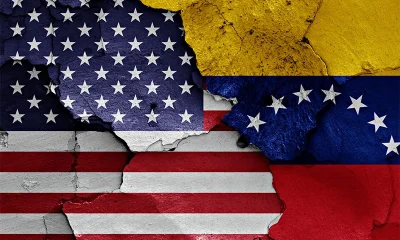
 Opinion3 days ago
Opinion3 days agoAmerican rulers’ hatred for Venezuela and its leaders






